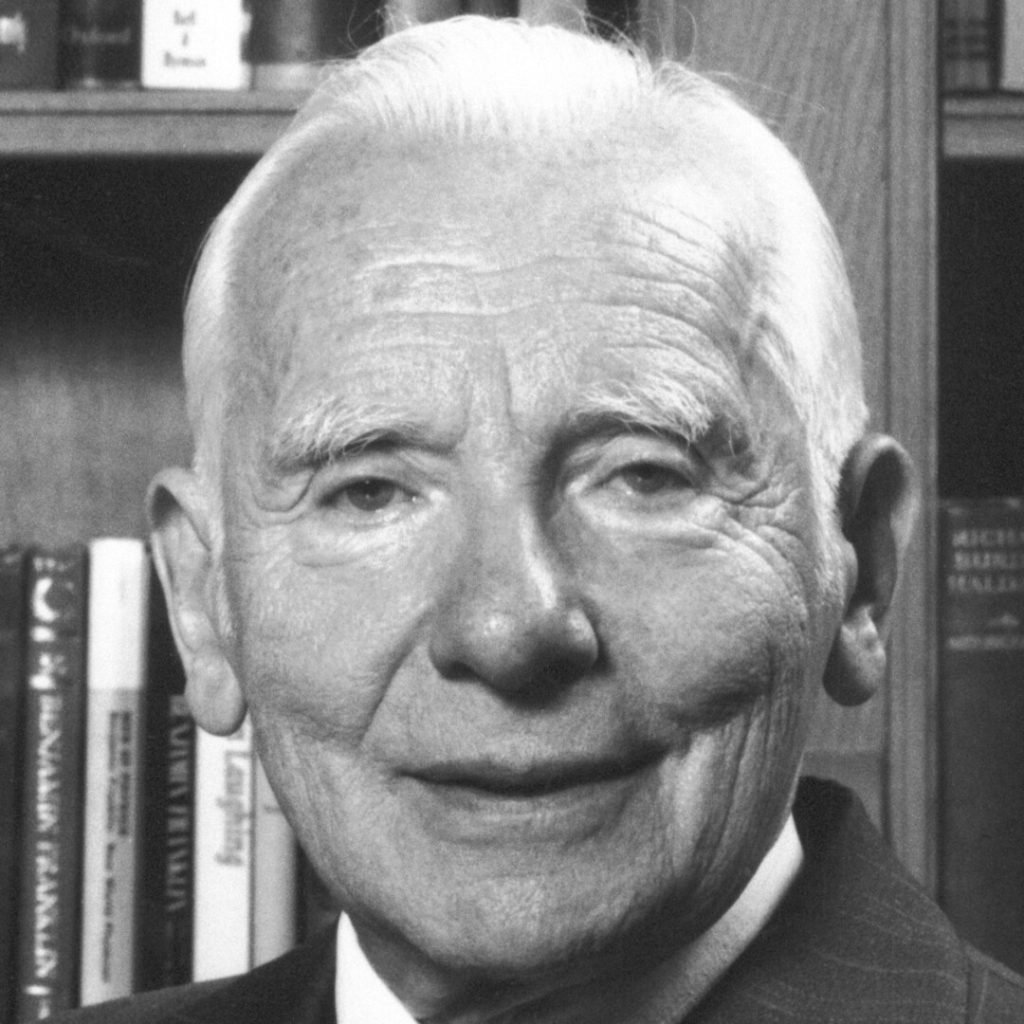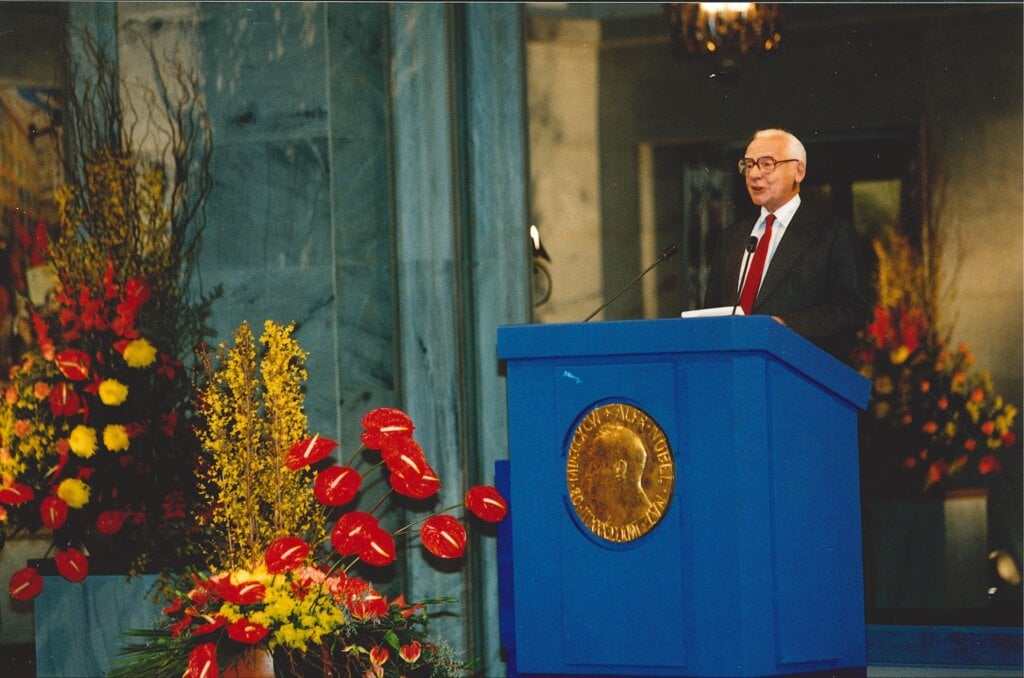Joseph Rotblat
Speed read
Joseph Rotblat was awarded the Nobel Peace Prize, jointly with Pugwash Conferences on Science and World Affairs, for his efforts to diminish the part played by nuclear arms in international politics.

Full name: Joseph Rotblat
Born: 4 November 1908, Warsaw, Russian Empire (now Poland)
Died: 31 August 2005, London, United Kingdom
Date awarded: 13 October 1995
Scientist and anti-nuclear activist
Joseph Rotblat received the Nobel Peace Prize in 1995, 50 years after the atom bomb was dropped on Hiroshima and Nagasaki and 52 years after he had first taken a stance against the development of this new weapon of mass destruction. According to Rotblat, science and research should serve the cause of peace. Born in Warsaw, Poland, Rotblat studied physics, becoming a researcher in Great Britain in 1939. He worked on splitting the atom and understood that it was possible to build an atom bomb. In 1943, he was given permission to withdraw from the Manhattan Project, a collaboration between the USA and the UK to create nuclear weapons. Since WWII, Rotblat tirelessly promoted peace, dialogue and disarmament through the Pugwash Conferences. Rotblat and the Pugwash Conferences were named co-recipients of the 1995 peace prize.
"So I ask the nuclear powers to abandon the out-of-date thinking of the Cold War period and take a fresh look. Above all, I appeal to them to bear in mind the long-term threat that nuclear weapons pose to humankind and to begin action towards their elimination. Remember your duty to humanity."
Joseph Rotblat, Nobel Prize lecture, 10 December 1995.

Rotblat and the Manhattan Project
In 1942, the USA and the UK began collaborating on a programme to build an atom bomb. Code-named the Manhattan Project, the experiments were to take place in Los Alamos, New Mexico. Soon after arriving there in 1943, Rotblat learned the discomfiting truth: the aim of the programme was to gain the upper hand over the communist Soviet Union. It was clear to Rotblat that Germany would not succeed in building an atom bomb before the war was over. He also feared that nuclear arms could be used in a showdown with the Soviet Union. Therefore, he returned to the United Kingdom and became a medical researcher.
| Manhattan Project US programme to build an atom bomb begun in 1942. European researchers also participated. The first test bomb was detonated in New Mexico in July 1945. |
The Russell-Einstein Manifesto
Soon after two atom bombs killed 200,000 Japanese civilians in 1945, Rotblat began warning of the dangers of radiation. Together with Albert Einstein and mathematician/philosopher Bertrand Russell, he formed the Emergency Committee of Atomic Scientists with the aim of conveying knowledge to the general public and influencing government policy. Rotblat was one of 11 prominent scientists who signed the Russell-Einstein Manifesto against weapons of mass destruction in 1955. The great response to the manifesto led to the founding of the Pugwash Conferences.
"It is fifty years this year since the two atomic bombs were dropped on Hiroshima and Nagasaki, and forty years since the issuing of the Russell-Einstein Manifesto. The Manifesto laid the foundations for the Pugwash Conferences which have maintained a high level of activity to this day. Joseph Rotblat was one of the eleven scientists behind the Manifesto and has since been the most important figure in the Pugwash work."
The Norwegian Nobel Committee, Announcement, 1995.
The 50-year Shadow
In May 2005, four months before his death and 60 years after atomic bombs were detonated over Japan, Rotblat wrote an appeal that he called “The 50-year Shadow”. The appeal was published in the New York Times. Rotblat was the last surviving signatory of the Russell-Einstein Manifesto, signed 50 years earlier in 1955. Rotblat thought that the contents of the manifesto were still as relevant as ever and he feared a new nuclear arms race. The peace laureate concluded with the manifesto’s appeal to mankind: “Remember your humanity, and forget the rest”.
| Atom bomb A bomb that explodes when its nuclei of uranium or plutonium atoms are split, triggering an extremely rapid nuclear chain reaction (fission). Developed in the USA during WWII. The first atom bombs – “Fat Man” and “Little Boy” – were used against Japan in August 1945. |
Learn more
Born Warsaw, 4 November 1908 (British citizen since 1946). Educated at the Free University of Poland and the University of Warsaw, Poland ...
Disclaimer: Every effort has been made by the publisher to credit organisations and individuals with regard to the supply of photographs. Please notify the publishers regarding corrections.
Nobel Prizes and laureates
Six prizes were awarded for achievements that have conferred the greatest benefit to humankind. The 12 laureates' work and discoveries range from proteins' structures and machine learning to fighting for a world free of nuclear weapons.
See them all presented here.
